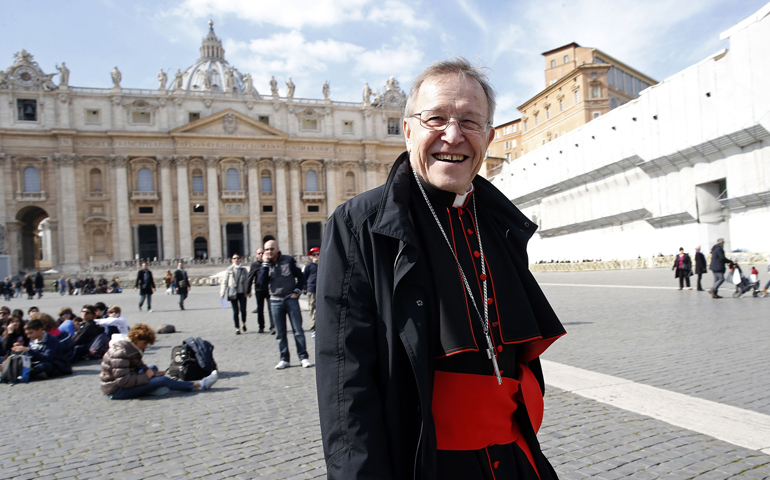
German Cardinal Walter Kasper walks in St. Peters Square on March 8 after the first day the College of Cardinals met to begin the process of electing a new pope. (CNS/Reuters/Tony Gentile)
Pope Francis has ushered in a new phase in the reforms of the Second Vatican Council, shifting the focus of the Catholic church from the concerns of the industrialized North that dominated debates of the past 50 years to the "problems of the Southern Hemisphere," according to a senior churchman.
German Cardinal Walter Kasper's comments in an article in Friday's edition of L'Osservatore Romano seemed to signal a return to a positive view of the impact of the council, away from the more pessimistic interpretation that often prevailed under Francis' predecessor, Benedict XVI.
Kasper stressed that since the first day of his pontificate, Francis "has given what I would call his prophetic interpretation of the council, and has inaugurated a new phase of its reception. He has changed the agenda: at the top are the problems of the Southern Hemisphere."
Francis, an Argentine Jesuit who was known as Cardinal Jorge Bergoglio until his election a month ago, has called for a "poor church, for the poor."
Francis' election and his priorities reflect a profound shift in church geography, said Kasper, a prelate who was for years the Vatican's top official for dialogue with other Christians before his retirement.
"At the beginning of the last century, only a quarter of Catholics lived outside Europe; today only a quarter live in Europe and more than two-thirds of Catholics live in the Southern Hemisphere, where the church is growing," Kasper wrote in the Vatican's semi-official daily.
The Second Vatican Council (1962-65) revolutionized Catholic life with the acceptance of religious liberty, ecumenism and freedom of conscience among other reforms.
The council generally adopted a more positive and open attitude toward the world than the church had ever taken, but its reception has been deeply divisive. Conservative Catholics say that the church's crisis of the past decades is a consequence of Vatican II's modernizing reforms, which included sidelining the ancient Mass in Latin and introducing a new rite in local languages.
But for Kasper, the "progressives," those who pushed for reforms in the council "were the true conservatives, those who wanted to renew ancient tradition."
Yet in the years following the council, he said, as some progressives rejected any link with church tradition and demanded further reforms, such as optional celibacy and women priests, Catholics didn't experience a new "springtime of the church" as was expected.
Today's church "has a wintery look, and shows clear signs of crisis," Kasper said.
But the cardinal rejects critics' claims that the council was "the greatest calamity in recent history."
Quoting a seminal 2005 speech by Pope Benedict -- who often clashed with Kasper -- Kasper says the council must not be interpreted as a "break" with tradition but as a "reform" and "renewal" in continuity with the church's past.
According to Kasper, this could now lead, under Pope Francis, to translating the council's statements into "practical consequences" that could rekindle its "innovative impulse."



